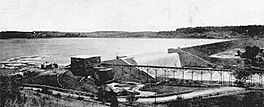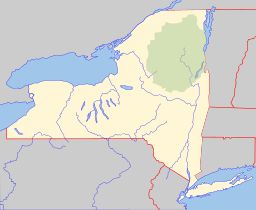Hinckley Reservoir facts for kids
Quick facts for kids Hinckley Reservoir |
|
|---|---|

Hinckley Dam in 1921
|
|
| Location | Herkimer County, Oneida County, New York |
| Coordinates | 43°19′58″N 75°04′27″W / 43.3326430°N 75.0741733°W |
| Type | Reservoir |
| Primary inflows | West Canada Creek Black Creek |
| Primary outflows | West Canada Creek |
| Basin countries | United States |
| Surface area | 2,707 acres (10.95 km2) |
| Average depth | 28 ft (8.5 m) |
| Max. depth | 75 ft (23 m) |
| Water volume | 25.8 billion US gallons (0.098 km3) |
| Surface elevation | 1,224 ft (373 m) when full |
| Settlements | Hinckley, New York, Utica, New York |
Hinckley Lake is a large reservoir located near Hinckley, New York. This important lake provides drinking water for about 130,000 people in the greater Utica, New York area. It also helps create electricity and is a popular spot for fun activities all year round. The lake is found in the towns of Russia in Herkimer County and Remsen in Oneida County.
The Gregory B. Jarvis Plant is a special power plant named after Gregory Jarvis. He was a 41-year-old payload specialist from the Mohawk Valley. Sadly, he passed away in 1986 aboard the Space Shuttle Challenger. This plant, which makes 9,000 kilowatts of power, started working in June 1986. It's located about 20 miles from Mohawk Central High School, where Jarvis graduated in 1963.
Contents
About Hinckley Lake
Hinckley Lake is a man-made lake. It was created by building a large dam across the West Canada Creek. The area around the lake is quite hilly, with heights ranging from about 1,165 to 3,100 feet above sea level. This region gets a lot of rain and snow, especially in winter.
The Dam
The dam at Hinckley Lake is very long, about 3,700 feet in total. A 400-foot section is made of strong masonry, which includes special gates and a spillway. A spillway is like a giant overflow drain for the dam. Most of the dam is an earthen structure, meaning it's made of packed earth. It has a concrete wall inside for extra strength.
The masonry part of the dam is 82 feet tall above the rock. The earthen part is 56 feet tall above the ground. Building this dam was a huge project.
Lake Size and Features
Hinckley Lake splits into two main parts. Together, these parts stretch for about thirteen miles. However, the lake is not very wide, only about half a mile across. The total area of the lake is about 4.46 square miles.
When the lake is full, its deepest point is 75 feet. The average depth is about 28 feet. To create this large lake, 209 buildings had to be moved. Parts of three villages were affected. Also, seven miles of roads were covered by the water. The lake is very helpful for controlling floods. It greatly reduces how fast floodwaters flow.
Fun Activities
Hinckley Lake is a great place for outdoor activities. Many people enjoy fishing here.
Fishing in the Lake
You can find several types of fish in Hinckley Lake. Some common fish include smallmouth bass, rock bass, black bullhead, pickerel, trout, and yellow perch.
There is a boat launch on the west side of the lake, off NY-365. You need to pay a fee to use it. This launch can handle all sizes of boats. If you don't have your own boat, there's also a business on the lake where you can rent one.
Lake History
The city of Utica first got its public water supply in 1850. Over time, as more people moved to the city, more reservoirs were built. In 1907, water from the West Canada Creek started flowing into the city.
The Reservoir's Completion
The Hinckley Reservoir was finished in 1915. It was built as part of a larger project for the canal system. Water from the West Canada Creek was taken from this reservoir to supply Utica.
In 1917, there was a small outbreak of typhoid fever in Utica. Investigations showed it was likely due to polluted water getting into the city's pipes. After this, the water quality from Hinckley was carefully checked. It was found to have some contamination. This led to efforts to make sure the water was safe to drink.
In 1928, there was an attempt to officially change the lake's name to Kayuhoora Lake. Landowners wanted the state to change it. However, people kept calling it Hinckley Lake, so the new name never really stuck.
Water Levels
The water level in Hinckley Reservoir changes over time. These changes are important for several reasons.
- When the water level is at about 1195 feet, the NYPA stops making hydropower.
- If the water level drops to about 1185 feet, it starts to affect the supply of drinking water.
- At about 1173.5 feet, the water levels are too low for canal navigation.
- Also at 1173.5 feet, the amount of water released for fish habitats is affected.
The reservoir's water level can sometimes drop quite low. For example, in May 2010, the water level was much lower than average for that time of year. This shows how important it is to manage the water carefully.
 | Jewel Prestage |
 | Ella Baker |
 | Fannie Lou Hamer |



